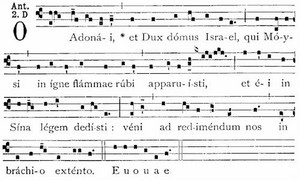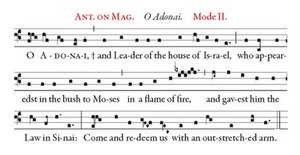18 December, O ADONAI
This is the central panel of a triptych painted by Nicolas Froment in 1476. It depicts Moses awestruck before the Burning Bush and the appearance of the Angel of the Lord. The Burning Bush — here a rose bush all ablaze with radiating flames — surrounds the Virgin Mother holding her Divine Son. The Child Christ holds a mirror in his hand in which both of them are reflected. The painting illustrates a mystical antiphon of the Office of January 1st to which I refer below.
A Precarious Note
Again today the great cry goes up, a cry wrung from the depths of our being, a cry framed between two expressive words: O and Veni. The musical treatment of both words is the same: do-fa-mi. The interval do-fa is a stretching heavenward. We hardly reach the dominant fa of our confidence when we fall to the precarious mi, an unstable note in the second mode, one that suggests just how fragile we are. The mi is suspended: we have cast our prayer upward into the heavens. The uncertainty of the mi obliges us to hope against hope, to believe without seeing, to abandon our prayer once we have thrown it into the heavens, trusting that the hand of God will receive it and take it to heart.

ADONAI
Yesterday we called to the Christ, naming Him Wisdom, Sapientia; today we call Him ADONAI, Sacred Lord, Master of All, Majesty. Today we have the most Jewish of the O Antiphons: ADONAI, Moses, and Sinai — the Lord God, the man of God, and the mountain of God are named in a single brief prayer. ADONAI is used frequently in the Hebrew scriptures. The Jews use it in place of the holy and unutterable name, the name that it is forbidden to pronounce. You see, then, the significance of this name given to Christ. Christ is the “angel of God” who appeared to Moses in a flame of fire out of the midst of a bush (cf. Ex 3:2). “And, lo, the bush was burning, yet it was not consumed. And Moses said, ‘I will turn aside and see this great sight, why the bush is not burnt” (Ex 3:2-3).

Apparuisti
The center and summit of today’s antiphon is the appearance of God to Moses in the burning bush. The most important word of the antiphon is apparuisti – “thou who didst appear.” It is on this word that the melody soars to the heights of “Horeb, the mountain of God” (Ex 3:1), giving to its last syllable the astonishing treatment of a double torculus: six notes in all!
The Virgin Mother of God
When Saint Joseph was confronted with the inexplicable mystery of Mary, his betrothed, being found with child, he was very much like Moses before the burning bush. “Lo, the bush was burning, yet it was not consumed” (Ex 3:2). An antiphon of January 1st makes exactly this comparison: “In the bush which Moses saw burning and yet not burnt, we recognize your virginity gloriously preserved. O Mother of God, intercede for us.” Man before the mystery. “I will turn aside and see” (Ex 3:3)

The Call of God
Moses’ experience before the burning bush is a paradigm of all prayer. God drew Moses out of himself, and captured his attention by means of the burning bush. “And when the Lord saw that he went forward to see, he called to him out of the midst of the bush, and said: ‘Moses, Moses!” And he said, ‘Here am I!'” (Ex 3:4). Just when we think that prayer is about our calling to God, we discover that it is really about God calling to us. Just when we think we have put our whole heart into saying, “Come!” to God, we discover that ceaselessly God puts His whole heart into saying “Come!” to us.
Adoration
God wants us close, very close to himself, but in the intimacy of adoration, in a wondering awareness of the Mystery. Adoration carries us into the infinity of God, into depths where our senses and our reason cannot go. And this is the reason why Moses is ordered to remove the shoes from his feet. “Do not come near; put off your shoes from your feet, for the place on which you are standing is holy ground” (Ex 3:5). Only then does God reveal Himself as the Maker of covenants (Gen 17:1-8), the Giver of Blessings (Gen 26:12), the Mysterious Wrestler in the night (cf. Gen 32:24-30). “And He said, ‘I am the God of your father, the God of Abraham, the God of Isaac, and the God of Jacob.” And Moses hid his face, for he was afraid to look at God” (Ex 3:6).
Saint Joseph
Saint Joseph too found himself drawn close, very close, to Mary his bride-with-child, but like Moses, he could not help but hide his face, that is, suspend the judgment of his senses and his reason. Saint Joseph’s chaste intimacy with his bride was one of amazement and wondering awe. Only after the message of the Angel in the night was Joseph able to live with the Mystery. “And he took his wife into his home” (Mt 1:24).
Moses hides his face; what he cannot see with his eyes of flesh, he perceives with the eyes of the heart. One understands too why Saint Joseph is the friend of those who suffer dark nights of not seeing so as to better see into the inscrutable depths of the Mystery. So it is, always, in prayer. “For now we see in a mirror dimly, but then face to face” (1 Cor 13:12). Paradoxically, in prayer, seeing comes from not seeing. This is why Saint Paul prays that the Ephesians may have “the eyes of their hearts enlightened, that they may know what is the hope to which God has called them” (cf. Eph 1:18).
I Have Seen
Only after having drawn Moses to himself in adoration and in the not-seeing that is seeing, does God reveal His plan: “I have seen the affliction of my people who are in Egypt, and have heard their cry because of their taskmasters; I know their sufferings, and I have come down to deliver them” (Ex 3:7). The Veni of today’s O Antiphon rests upon this promise. Christ-ADONAI sees our affliction. Christ-ADONAI hears our cry. Christ-ADONAI knows our sufferings. Christ-ADONAI has come, comes even now, and will come again to deliver us. Veni! The instability of that mi becomes a tremor of joy.
In Brachio Extento: the Cross
Today’s O Antiphon ends with a mysterious allusion to the Cross. Veni ad redimendum nos in brachio extento — “Come to redeem us with an outstretched arm.” There is certainty and rest in the last note of the antiphon. The final re is where all our hopes come to rest in an unshakeable confidence. We know that the arms of the Crucified outstretched on the wood of the Cross draw us even now into the embrace of God. This is the reality of every celebration of the Holy Sacrifice of the Mass, the definitive answer to our Veni. “Come,” we cry. And ADONAI, our crucified, risen, and returning Christ answers, “Come to me . . . and I will give you rest” (Mt 11:28).


Hope against hope… believe without seeing… abandon our prayer once we have thrown it into the heavens, trusting that the hand of God will receive it and take it to heart…
So beautiful, Father. Thank you.
FD
The outstreched arm brought to my mind the image of the Icon of the Harrowing of Hell, where Christ is depicted pulling Adam and Eve from the grave with his oustreched arm.
The Lord’s power is truly in His oustreched arm… upon the live-giving Wood!